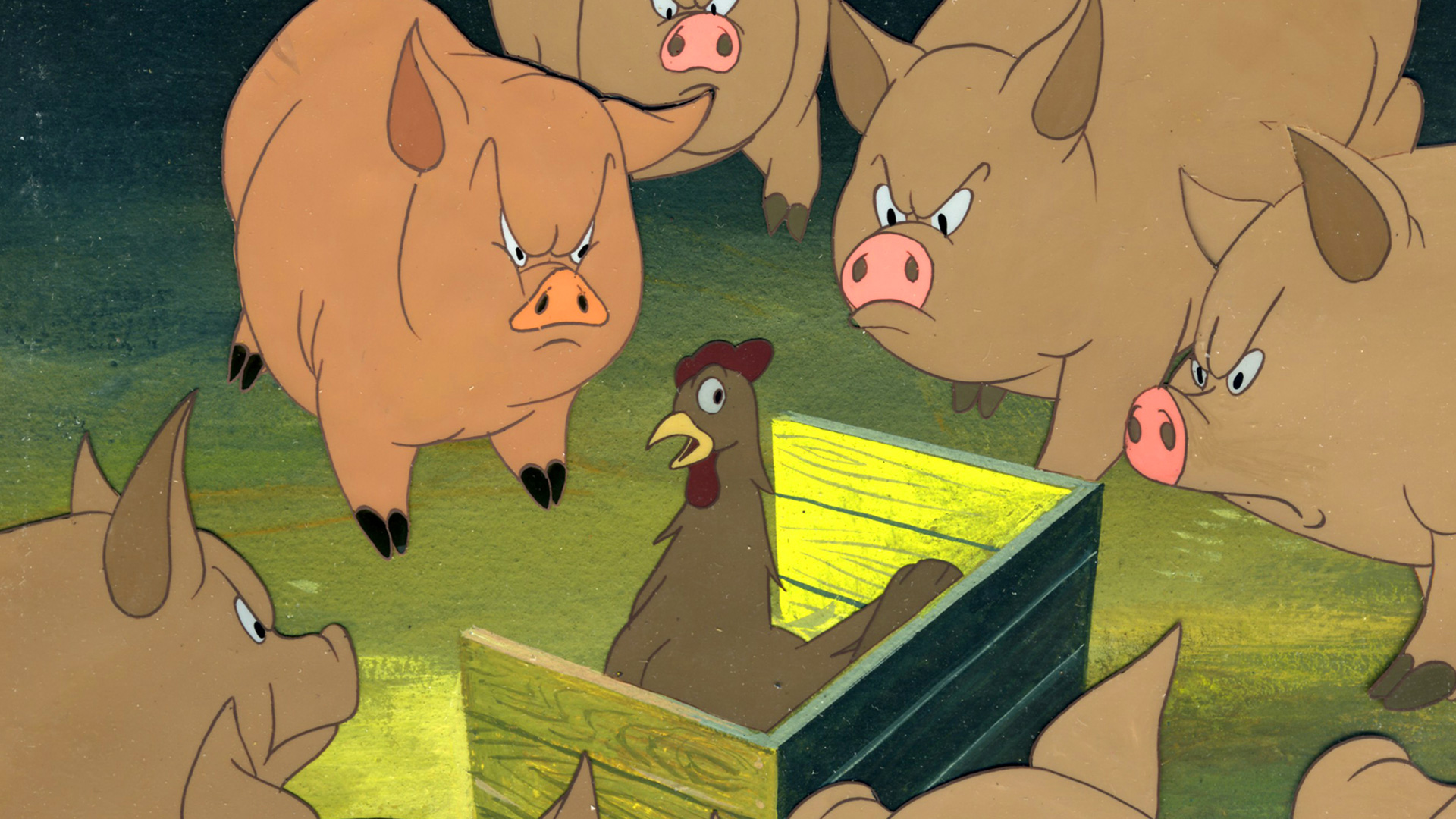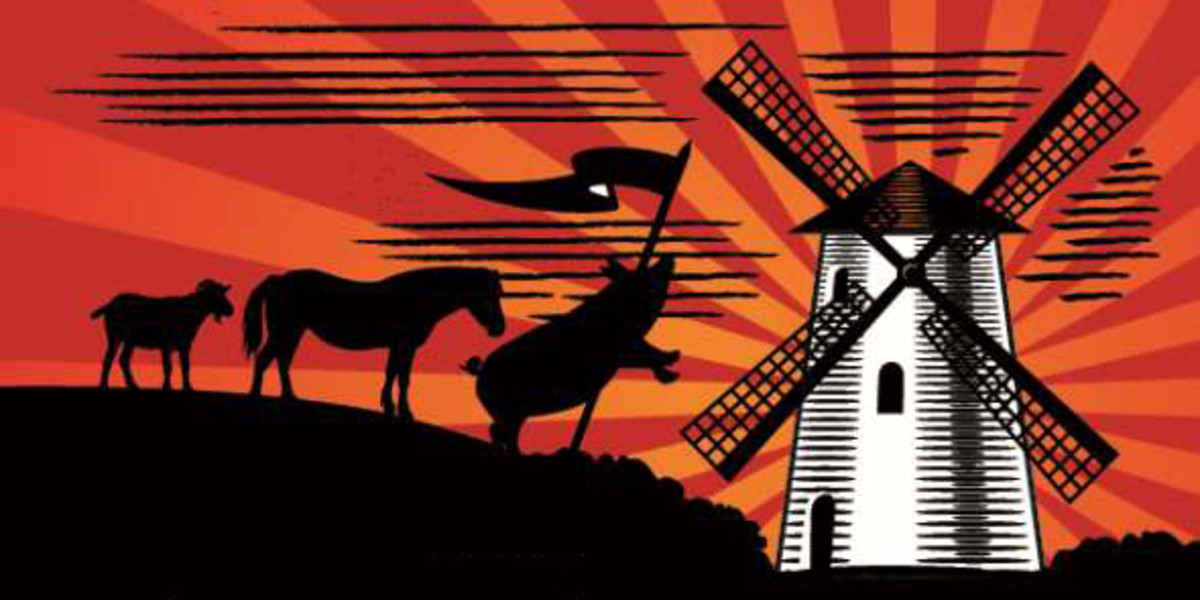Summary of animal farm chapter 4 – In Chapter 4 of Animal Farm, Orwell’s allegorical tale takes a captivating turn, revealing deeper meanings and character arcs. From the allegorical meanings behind the events to the narrative techniques that enhance the chapter’s impact, let’s dive into the rich tapestry of Chapter 4.
The chapter introduces key events that shape the farm’s dynamics, with characters playing pivotal roles in the unfolding drama.
Chapter Summary

Chapter 4 of Animal Farm unfolds with the animals adjusting to their new self-governance. The pigs, led by Napoleon, emerge as the dominant force, gradually consolidating their power and control over the farm.
Napoleon’s Rise to Power
Napoleon, with his cunning and ambition, takes advantage of the animals’ trust and manipulates them to his advantage. He undermines Snowball’s authority, accusing him of treason and ultimately driving him off the farm.
In Chapter 4 of Animal Farm, the animals discover that their lives have not improved under Napoleon’s rule. They decide to rebel, but their plans are overheard by a raven who reports them to Napoleon. Napoleon then executes the rebels, and the animals are left feeling hopeless.
In makima is listening chapter , we see a similar theme of rebellion and the consequences of speaking out against authority. Like the animals in Animal Farm, the characters in Makima is Listening must face the difficult choice of whether to speak out or to remain silent in the face of oppression.
Changes in the Commandments
As Napoleon’s grip tightens, he alters the Seven Commandments, the guiding principles of Animalism, to suit his own agenda. The commandment against walking on two legs is modified, allowing the pigs to engage in human-like behaviors.
The Dogs’ Role
Napoleon’s control is maintained through the loyalty of his fierce dogs, who enforce his will and intimidate the other animals. They act as his personal guard, silencing any opposition and ensuring his absolute authority.
In Animal Farm Chapter 4, the animals revolt against their human oppressors, symbolizing the Russian Revolution. The pigs, led by the cunning Napoleon, seize power and manipulate the other animals, mirroring the rise of Stalinism. Now, shift your attention to the thrilling world of black clover chapter 351 , where Asta and his comrades face a formidable challenge.
Returning to Animal Farm Chapter 4, we see how the pigs’ betrayal leads to a dystopian society, a stark reminder of the dangers of power and ideology.
Allegorical Meanings: Summary Of Animal Farm Chapter 4

In Chapter 4 of “Animal Farm,” the allegorical meanings behind the events and characters play a crucial role in conveying the broader themes of the novel.
The allegory of the windmill represents the Soviet Union’s ambitious industrialization plans, while the pigs’ manipulation of the animals symbolizes the manipulation of the masses by the ruling class.
Animalistic Motifs
The animalistic motifs in the chapter further emphasize the allegorical nature of the story. The pigs’ behavior, for instance, mirrors the manipulative and cunning tactics employed by those in power.
Symbolism of the Windmill
The windmill itself holds immense symbolic value. Its construction represents the Soviet Union’s desire for economic growth and modernization, while its destruction symbolizes the failure of these plans due to mismanagement and corruption.
Character Development

In Chapter 4 of Animal Farm, the animals’ character arcs continue to take shape. Their actions and interactions reveal their evolving personalities and motivations.
Boxer
Boxer’s unwavering loyalty and determination remain steadfast. Despite the hardships he faces, he refuses to give up on the dream of Animal Farm. His unwavering belief in the cause, even in the face of adversity, adds depth to his character.
Squealer, Summary of animal farm chapter 4
Squealer’s cunning and manipulative nature becomes more pronounced. He uses his persuasive abilities to justify the pigs’ actions and maintain their power. His willingness to twist the truth and distort reality highlights his cunning and self-serving nature.
In Chapter 4 of Animal Farm, the animals are struggling to adjust to their new lives without Mr. Jones. They are hungry and cold, and they are starting to realize that life under their new leaders is not as rosy as they had hoped.
This chapter foreshadows the themes of power and corruption that will be explored in later chapters.
As the animals struggle, it is worth considering the concept of reincarnation. In the standard of reincarnation chapter 1 , we learn that reincarnation is a process of spiritual evolution.
The animals in Animal Farm are in a state of spiritual evolution, and their experiences in this life will help them to grow and learn. Just as the animals in Animal Farm are struggling to find their place in the new world, so too are we all struggling to find our place in the world.
We are all on a journey of spiritual evolution, and the challenges we face in this life are opportunities for us to grow and learn.
Benjamin
Benjamin’s cynical and aloof nature persists. He remains an observer, refusing to participate in the farm’s affairs. His cynical remarks and detached demeanor offer a unique perspective on the events unfolding.
Mollie
Mollie’s vanity and self-centeredness are further emphasized. Her refusal to work and her pursuit of comfort and luxury expose her shallow and self-serving nature.
The Sheep
The sheep’s blind obedience and susceptibility to manipulation become more apparent. They blindly follow the pigs’ orders, even when it goes against their own interests. Their herd mentality and lack of critical thinking highlight the dangers of blind obedience.
Narrative Techniques

In Chapter 4, Orwell employs several narrative techniques to enhance the impact of the story and convey deeper meanings. These techniques include symbolism, foreshadowing, and irony.
Symbolism
The use of symbolism in the chapter is particularly evident in the animals’ transformation. The pigs’ assumption of human-like characteristics, such as wearing clothes and walking upright, symbolizes the corruption of power and the dangers of totalitarianism. The windmill, which initially represents hope and progress, later becomes a symbol of oppression and exploitation.
Foreshadowing
Orwell skillfully employs foreshadowing to hint at future events and create a sense of suspense. For instance, the pigs’ early attempts to control the other animals through propaganda and manipulation foreshadow their eventual dictatorship. The animals’ initial excitement about the windmill also foreshadows its eventual failure and the hardships it will bring.
Irony
Irony is used throughout the chapter to highlight the contradictions and absurdities of the animals’ situation. The animals’ belief that they are creating a society of equality and justice is ironic, given the pigs’ increasing power and oppression. The windmill, intended to improve their lives, ultimately becomes a symbol of their exploitation.
These narrative techniques work together to create a powerful and thought-provoking story that explores the dangers of totalitarianism, the corruption of power, and the importance of individual freedom.
Final Conclusion

Chapter 4 of Animal Farm is a testament to Orwell’s literary prowess, weaving allegory, character development, and narrative techniques to create a thought-provoking and engaging chapter. It sets the stage for the novel’s broader themes, leaving readers eager to delve deeper into this timeless classic.